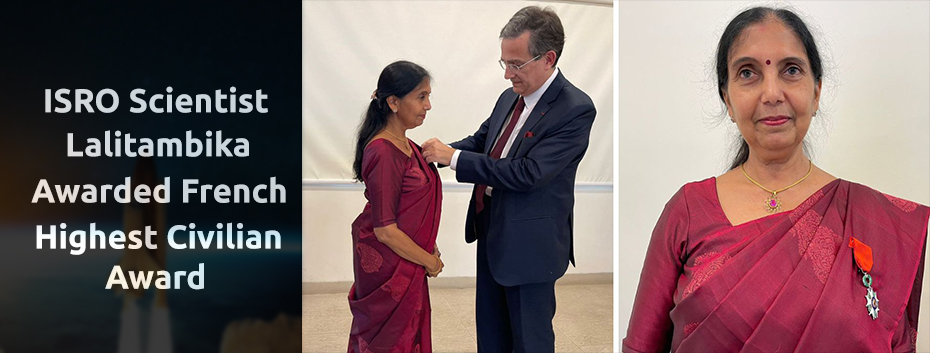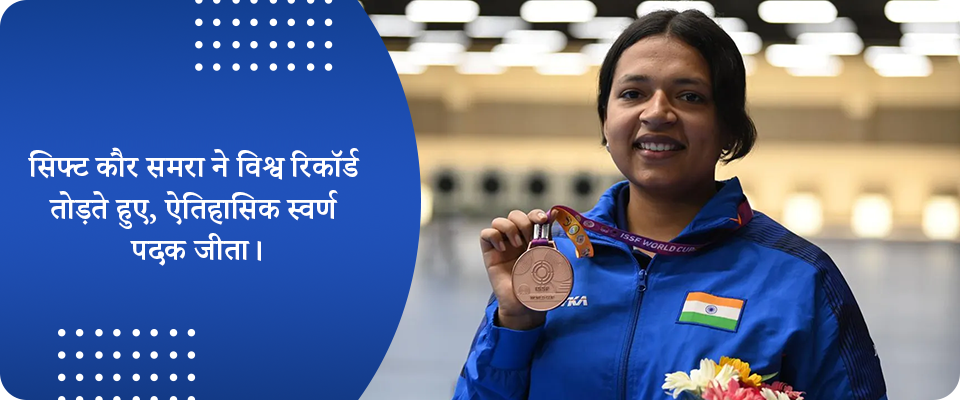![]() English
English
ISRO Scientist Lalitambika Awarded French Highest Civilian Award

Distinguished scientist and former director of the Directorate of the Human Spaceflight Programme at ISRO, V R Lalitambika was conferred the Légion d’honneur award which was given to her by the Ambassador of France, Thierry Mathou. Légion d’honneur is the highest French civilian award given to the most deserving citizens in all fields of activity presented on behalf of the Head of State for over two centuries. This accolade was presented to acknowledge her noteworthy & remarkable involvement in promoting space cooperation between France and India.
Napoleon Bonaparte brought into existence the Legion of Honor accolade in the year 1802 as the highest merit award given by the French Republic to deserving candidates. This award is bestowed in recognition of significant service to France, without taking into regard the nationality of the person receiving the honor. V R Lalitambika, a well-renowned scientist at the Indian Space Research Organization, and an advanced launch vehicle technology specialist at ISRO was recognized by the French Republic for her pivotal role in signing off the very first joint agreement between India and France, that is, French National Space Agency and Indian Space Research Organization back in 2018 where the mentioned agencies work in co-operation in the specified area of space medicine.
Lalitambika has mainly provided her contribution to several ISRO rocket launches, especially the PSLV rockets (Polar Satellite Launch Vehicle). The said information was relayed in a press article released by the Embassy of France in India. In the same year when the joint agreement took place, Lalitambika worked closely with the CNES (Centre national d’études spatiales – CNES) or the French National Space Agency for the success and development of the Gaganyaan project. Three years later, in 2021, Lalitambika once again helped in signing another agreement between the CNES and ISRO concerning the Indian Astronaut Program. The signing event took place when the Minister of French Foreign Affairs paid a visit to ISRO in Bengaluru. As per the terms of this agreement, the French Space Agency provides training to the Indian flight physicians and the Capsule Communication (CAPCOM) mission control teams. The training is given at France’s CADMOS (CNES User Support and Operation Centre) at Toulouse and at the European Astronaut Centre (EAC) which is located in Germany, for the advancement of microgravity and space operations.
Thierry Mathou, Ambassador of France, shared his delight in bestowing the highest civilian award to Dr. V. R. Lalitambika, recognizing her as a well-known scientist and a groundbreaker in the field of space technology. He appreciated her contributions, level of expertise, passion, and efforts which led to the Indo-French space agreement and partnership. Lalitambika expressed her gratitude, and hope upon receiving this accolade. She stated that her receiving this prestigious award would inspire plenty of women to pursue STEM careers and flourish in their chosen fields. She is the second scientist from ISRO to receive this honorary accolade. Former ISRO chairman A S Kiran Kumar was the first ISRO scientist to be awarded the Legion d’Honneur of France for fostering Indo-French space cooperation in 2019.
“Lalithambika is an inspiration to the next generation of scientists not only in Toulouse but also in India, where she promoted inclusivity by enabling the recruitment of civilians, including women, to participate in the future of the Indian astronaut program,” the French embassy in India said in a statement.
A resident of Kerala, Lalitambika grew up and studied in Kerala, was fascinated by the space program and was interested in it by watching the sounding rocket launches from Thumba along with her grandfather M N Ramakrishnan Pillai, which was close to where she lived. Her grandfather was a mathematician. She was the topper of her class and graduated as a chemical engineer from the College of Engineering, Trivandrum. She held the second position at the University of Kerala and got her post-graduate degrees in MTech and COE and even a PhD in electrical engineering from the same university in the year 2009.
Lalithambika 1998 joined ISRO’s Vikram Sarabhai Space Centre in 1998 as a launch vehicle autopilot design engineer and slowly developed and enlarged her field of work and did not restrict herself to just one domain. With the expansion, she gained the entirety of the design and validation activities and flight telemetry data management for ISRO launch vehicle missions. In 2018, she became the first director of the Directorate of the Human Space Program at ISRO.
According to the ISRO profile of the distinguished scientist, Her efforts and commitment to work were commendable which brought forward the Human Spaceflight Program, Gaganyaan along with the launching of the Human Spaceflight Centre. Her major contributions included significant crew selection criteria, training curriculum, and careful selection of Indian Astronaut Trainees. Even ISRO mentioned, “She has designed the autopilot for the PSLV, the GSLV, the GSLV Mk III and later, led the team in developing guidance and autopilot systems, flight software, and validation of navigation, guidance, and control systems for all ISRO ascent and re-entry missions.”
About ISRO
ISRO, Indian Space Research Organization, is the Indian national space agency. It is the primary, functional, and R&D arm of the DoS (Department of Space) which is observed and watched by the Prime Minister of India. The Chairperson of ISRO is also the Executive of DoS. ISRO’s primary focus is related to space-related tasks, international space cooperation, exploration of space, and advancement of space technology. ISRO is one of the six space agencies in the world handled by their respective country’s government, which is capable of the full launch of rockets or vehicles, deploying cryogenic engines, launching extraterrestrial missions, and operating a huge number of artificial satellites. ISRO is one of the four that is completely able to have soft landing capabilities.
Previously called the Indian National Committee for Space Research (INCOSPAR), established under the power of Jawaharlal Nehru upon receiving suggestions from Dr. Vikram Sarabhai in 1962, realizing the need in the field of space research and exploration. INCOSPAR then took the name ISRO in 1969 under the Department of Atomic Energy. The Indian government then launched a Space Commission and DoS in the year 1972 and ISRO came under the management of DoS. With the initiation of ISRO, this became a gear and fuel to pave the way for space activities in India. DoS, on the other hand, manages ISRO as well as other several institutions in India in the domain of astronomy & space technology.




